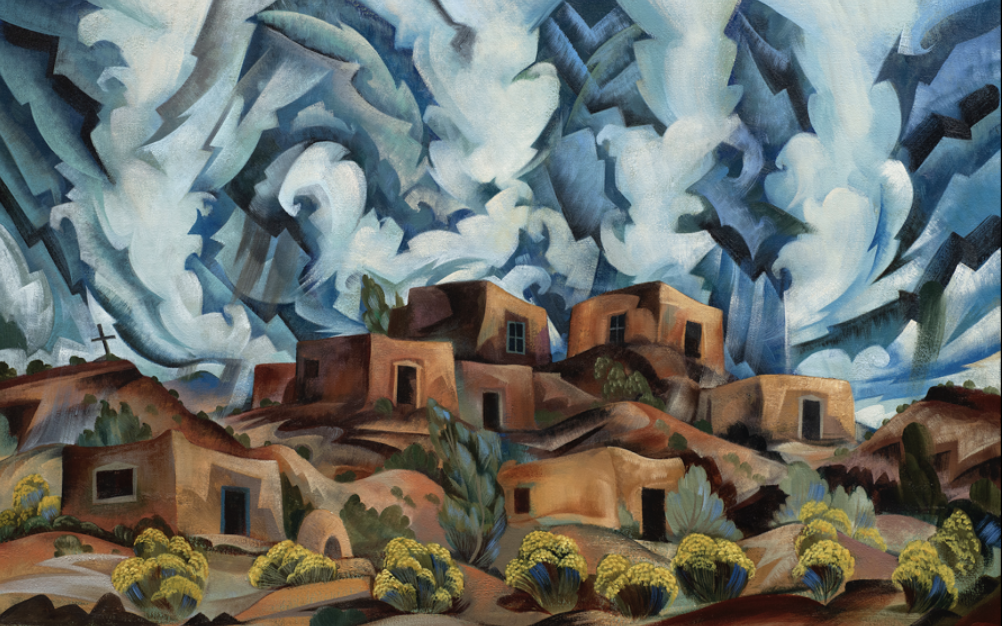
- Details
- By Native News Online Staff
The Colby College Museum of Art and its Lunder Institute for American Art, located in Waterville, Maine, will host a two-day symposium Friday, Nov. 3 and Saturday, Nov. 4. The symposium was organized in conjunction with the Painted: Our Bodies, Hearts, and Village exhibition, on view through July 28, 2024.
Exhibition collaborators, artists, curators, and scholars will gather for a series of panel discussions on Native American art, American art, and art of the American West. Topics will include how Native artists delve into historical collections to assert visual sovereignty, how to activate museum collections in new and reparative ways, collaborations between institutions and Native communities, and more.
The symposium will provide an opportunity to participants to reflect on the relationship between art, shared histories, and lived experiences, incubating new paths within art history, art practice, and the museum field. Register here.
Friday, November 3
4–5 pm: Viewing of Painted: Our Bodies, Hearts, and Village
Colby Museum, Lunder Wing, lower level
Join us for close looking and informal conversation in the exhibition’s galleries, facilitated by exhibition curators and members of the museum staff.
5–6 pm: Welcome and conversation with project collaborators
Given Auditorium, Bixler Art and Music Center
Opening remarks from Jacqueline Terrassa, Carolyn Muzzy Director, Colby Museum, followed by a conversation moderated by Beth Finch, Head Curator, Colby Museum
Participants:
- Juan Lucero (Isleta Pueblo), exhibition co-curator, Program Manager for Native Art Professional Development, First People’s Fund
- Jill Ahlberg Yohe, exhibition co-curator, Associate Curator of Native American Art, Minneapolis Institute of Art
- Siera Hyte (Cherokee Nation), exhibition co-curator, Manager of Programs and Fellowships, Lunder Institute for American Art and former Assistant Curator of Modern and Contemporary Art, Colby Museum
- Virgil Ortiz (Cochiti Pueblo), exhibition designer, artist
- Ron Martinez Looking Elk (Taos Pueblo/Isleta Pueblo), exhibition advisory council member, artist, International Community Development Specialist for Americans for Indian Opportunity, First People’s Fund board of directors
- Theresa Secord (Penobscot), exhibition advisory council member, artist, founding director of the Maine Indian Basketmakers Alliance, First People’s Fund board of directors, Colby Museum board of governors
6–7:30 pm: Opening reception
Colby Museum lobby
Join us for celebratory food and drinks in the Colby Museum lobby. Free and open to all.
Saturday, November 4
10–10:45 am: Opening address from Brian Vallo (Acoma Pueblo)
Given Auditorium, Bixler Art and Music Center
Brian Vallo served as governor of Acoma Pueblo in 2019–21, formerly directed the Indian Arts Research Center, and was the founding director of the Sky City Cultural Center and Haak’u Museum. He has spent more than thirty years working in museum development, repatriation of ancestors and cultural patrimony, cultural preservation, the arts, and tourism.
11 am–Noon: Artist panel on visual sovereignty
Given Auditorium, Bixler Art and Music Center
More Stories Like This
Chickasaw Holiday Art Market Returns to Sulphur on Dec. 6Center for Native Futures Hosts Third Mound Summit on Contemporary Native Arts
Filmmakers Defend ‘You’re No Indian’ After Demand to Halt Screenings
A Native American Heritage Month Playlist You Can Listen to All Year Long
11 Native Actors You Should Know
Help us defend tribal sovereignty.
At Native News Online, our mission is rooted in telling the stories that strengthen sovereignty and uplift Indigenous voices — not just at year’s end, but every single day.
Because of your generosity last year, we were able to keep our reporters on the ground in tribal communities, at national gatherings and in the halls of Congress — covering the issues that matter most to Indian Country: sovereignty, culture, education, health and economic opportunity.
That support sustained us through a tough year in 2025. Now, as we look to the year ahead, we need your help right now to ensure warrior journalism remains strong — reporting that defends tribal sovereignty, amplifies Native truth, and holds power accountable.
 The stakes couldn't be higher. Your support keeps Native voices heard, Native stories told and Native sovereignty defended.
The stakes couldn't be higher. Your support keeps Native voices heard, Native stories told and Native sovereignty defended.
Stand with Warrior Journalism today.
Levi Rickert (Potawatomi), Editor & Publisher


